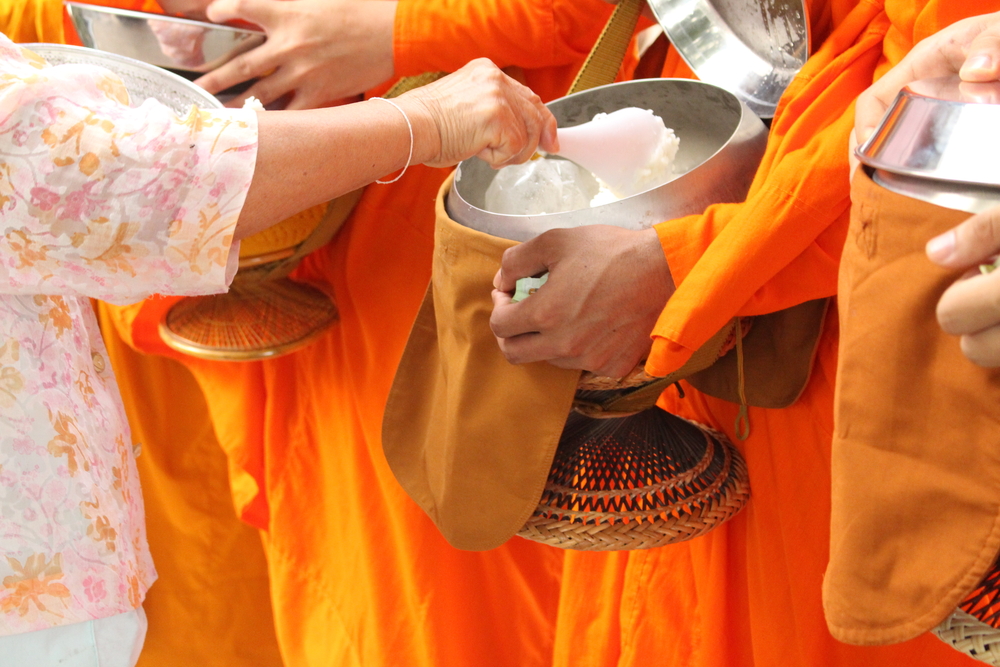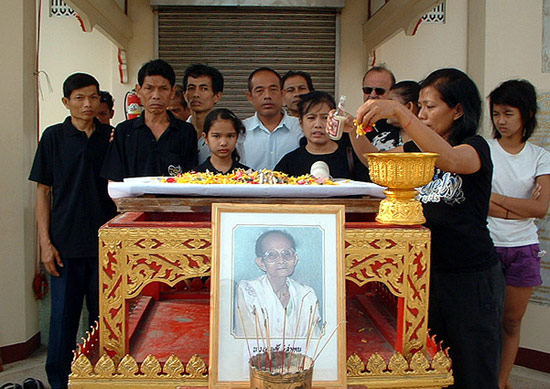Life Stages: Death
Theravada Buddhism stresses the inevitable and universal nature of death and teaches that the pain in death is only caused by the folly of attachment. Thais believe that the only way to escape the fear of death is to achieve nirvana, or disinterested wisdom and compassion.
Thais believe that a person who is dying should concentrate on the Buddhist scriptures and repeat Buddha’s name. This is supposed to improve the person’s next incarnation.
Ceremonies
Funeral ceremonies are often elaborate and are among the most important life cycle ceremonies. When a person dies, the body is washed, shrouded, and placed in a coffin surrounded by candles, wreaths, flowers, and incense. Monks chant throughout the funeral rituals. A yellow ribbon called the bhusa yhong, extending from the body to the chanting monks, is believed to connect the deceased with the sutras, or the scriptures that are chanted.
Wakes last until all family members arrive, sometimes up to a week. Cremation can also be put off to show respect for the dead person. When that’s the case, people hold memorials on the seventh, fiftieth, and hundredth days after death. During the wake, whether it is long or short, monks visit the home of the deceased to chant the abhidharma, one of the three main doctrines of the Pali Buddhist canon. The monks are given food in the name of the deceased, to help the dead person earn merit in his or her next life.
On the day of the cremation, relatives and friends of the deceased carry the coffin in a procession led by monks chanting scriptures. The coffin is placed on a pyre and is lit with burning candles, incense sticks, and perfumed wood. Afterwards, the ash is collected and kept in an urn.
Funerals for monks and people of high social standing tend to be long and complex. Someone who dies a violent death or commits suicide is usually buried as soon as possible, and mourners curtail the ceremonies out of fear that the person’s spirit might stay behind as an evil ghost. The music and the presence of loved ones generally keep the spirits at bay.
Death anniversaries are celebrated every year. Family and friends of the deceased invite monks to chant verses and bless the ashes, which may be kept at home or in the monastery grounds. People also make offerings of food and gifts to the dead through the monks.
The Afterlife
Thais believe that those who die are reborn. The form a person takes in his or her new birth depends entirely on the amount of merit accumulated in the previous life. The cycle of death and rebirth continues as long as people remain ignorant and desire worldly things. Once a person breaks all worldly bonds and frees his or her soul, he or she reaches nirvana, or enlightenment, and stops being reborn.
Copyright © 1993—2025 World Trade Press. All rights reserved.

 Thailand
Thailand 
